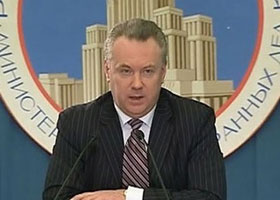Azerbaijan, Baku, March 27 / Trend E.Tariverdiyeva /
The three co-chairs of the OSCE Minsk Group are working very intensively and consistently, and the question of replacing France in the OSCE by the EU mandate today is not on agenda, Russia 24 quoted Russian Foreign Ministry spokesman Alexander Lukashevic as saying on Tuesday.
"The three co-chairs work very constructively, and in recent years in addition to the intensity of contacts the volume of documents that are coordinated at various levels, including the highest increased," said Lukashevic.
He said the last example is a statement of the Foreign Ministers of the Minsk Group co-chairs in support of efforts to resolve the Nagorno-Karabakh conflict indicated that there is room for maneuver and the impact on the parties to the conflict.
In connection with the 20th anniversary of the official request for mediation in the settlement of the Nagorno-Karabakh conflict, the Ministers of Foreign Affairs of the OSCE Minsk Group called on the conflicting parties to show political will necessary to achieve a lasting and peaceful settlement, said a joint statement of the Russian Foreign Minister Sergey Lavrov, U.S. Secretary of State Hillary Clinton and French Foreign Minister Alain Juppe, made on March 22.
Lukashevic said there is a need that MG implements the signal of the sides of the Nagorno-Karabakh conflict, which was made in a meeting with the Russian President in Sochi in January, where Baku and Yerevan announced that they are ready to accelerate work on the basic principles of the settlement.
"Probably, these signals indicate that the format of the Minsk Group established itself and the potential is not exhausted," said Lukashevic.
The conflict between the two South Caucasus countries began in 1988 when Armenia made territorial claims against Azerbaijan. Armenian armed forces have occupied 20 per cent of Azerbaijan since 1992, including the Nagorno-Karabakh region and seven surrounding districts.
Azerbaijan and Armenia signed a ceasefire agreement in 1994. The co-chairs of the OSCE Minsk Group - Russia, France and the U.S. - are currently holding peace negotiations.
Armenia has not yet implemented the U.N. Security Council's four resolutions on the liberation of the Nagorno-Karabakh and the surrounding regions.






